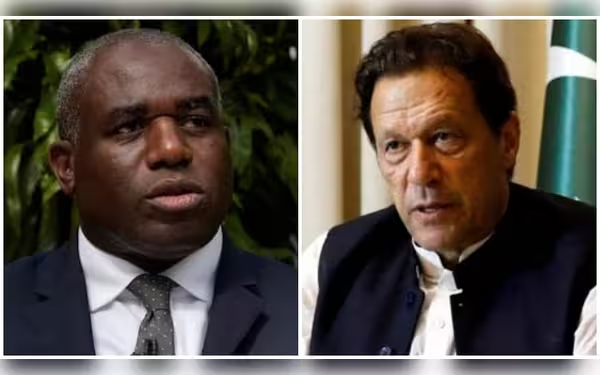Wednesday, January 15, 2025 11:13 AM
Imran Khan's Military Trial Status Clarified by UK Foreign Secretary
- No plans for Imran Khan's military trial, says UK official.
- Concerns over Pakistan's judiciary and human rights raised.
- UK emphasizes importance of civil liberties in democracy.
 Image Credits: geo
Image Credits: geoUK Foreign Secretary David Lammy states no military trial for Imran Khan, highlighting concerns over Pakistan's judiciary and civil liberties.
In a significant development regarding the legal status of former Prime Minister Imran Khan, British Foreign Secretary David Lammy has stated that there are currently no indications from Pakistani authorities about plans to try Khan in a military court. This statement comes in response to concerns raised by UK Member of Parliament Kim Johnson, who had written to the British government on behalf of Zulfi Bukhari, Khan's adviser on international affairs.
Lammy expressed his apprehensions about the potential use of military courts for civilians, emphasizing that such courts often lack transparency and independent oversight. He stated, "We have no recent indications from the Pakistani authorities that they intend to try Imran Khan in a military court, but my officials continue to monitor the situation closely." This assurance is crucial as it highlights the ongoing scrutiny of Pakistan's judicial processes by international observers.
Concerns regarding the state of the judiciary in Pakistan have been mounting, particularly following the passage of the 26th Amendment. Bukhari had previously coordinated a letter signed by 20 MPs from various parties, which raised alarms about the changes in the judicial landscape and their implications for human rights. Lammy reiterated that while Pakistan's judicial matters are primarily domestic, it is essential for the authorities to adhere to international obligations, particularly regarding fundamental freedoms such as the right to a fair trial and humane treatment.
Moreover, Lammy acknowledged the restrictions on freedom of expression and assembly in Pakistan, particularly concerning political opposition. He stated, "The freedom to hold and express views without censorship, intimidation or unnecessary restriction is a cornerstone in a democracy." This statement underscores the importance of civil liberties in maintaining a healthy democratic environment.
In light of these developments, Minister Falconer, who is responsible for Pakistan within the Foreign, Commonwealth and Development Office, has emphasized the need to uphold civil and political rights during his engagements with Pakistani officials. Falconer is expected to visit Pakistan later this year, where he will seek to meet with parliamentarians to discuss these pressing issues further.
As the situation unfolds, it is clear that the international community is closely watching Pakistan's judicial processes and human rights practices. The concerns raised by UK MPs reflect a broader apprehension about the state of democracy in Pakistan, where citizens continue to advocate for their rights amidst a challenging political landscape. The ongoing dialogue between the UK and Pakistan regarding these issues is vital, as it not only highlights the importance of accountability and transparency but also reinforces the notion that the rule of law is fundamental to any democracy.
The situation surrounding Imran Khan and the potential for military trials raises critical questions about the future of democracy and human rights in Pakistan. As citizens and international observers alike call for adherence to legal standards and fundamental freedoms, it is imperative for the Pakistani government to respond positively to these calls. The path forward must prioritize the rule of law and the protection of civil liberties, ensuring that all citizens, including political leaders, are treated fairly and justly under the law.













